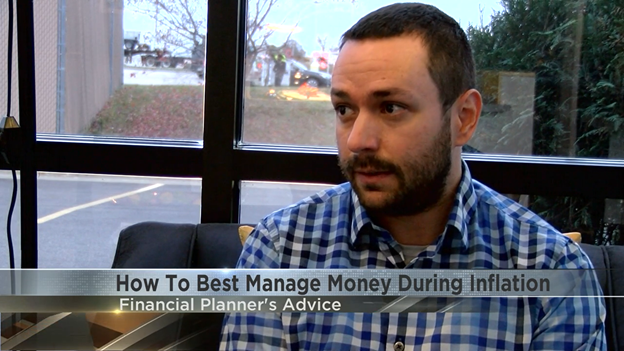Inflation rates have recently risen to levels we haven’t seen in 30+ years. Sustained inflation can cause real challenges as your purchasing power degrades over time.
If higher prices are creating a strain on your finances, there are 3 things you can do to minimize the impact:
- Reduce consumption (Budget)
- Increase income (Pick up shifts at work, ask for a raise)
- Invest savings (Consider a high yield savings account combined with a diversified portfolio)
Check out my interview with KTTC for some tips on dealing with higher prices (Video).
While none of these things may be easy to do, the good news is the Federal Reserve has indicated they expect high inflation to be temporary.
According to Atlanta Fed President Raphael Bostic, for now he expects inflation to “episodic”. “By episodic, I mean that these price changes are tied specifically to the presence of the pandemic and, once the pandemic is behind us, will eventually unwind, by themselves, without necessarily threatening longer-run price stability,” Bostic said.
While heightened inflation could be temporary, it may be best to hope for the best, but prepare your finances in case we see sustained inflation over the longer term.
Investment strategies to keep pace with inflation
 One thing that makes inflation particularly difficult for savers is the low interest rate environment we have been in. Your cash at the bank makes close to no interest, yet prices are increasing on everything you buy. That can cause your purchasing power to degrade over time if you aren’t invested.
One thing that makes inflation particularly difficult for savers is the low interest rate environment we have been in. Your cash at the bank makes close to no interest, yet prices are increasing on everything you buy. That can cause your purchasing power to degrade over time if you aren’t invested.
If this is you – consider investing in a diversified portfolio that includes investments that will go up with inflation. Series I savings bonds and Treasury Inflation Protected Securities (TIPS) are examples of investments that are designed to keep pace with inflation. In fact, Series I savings bonds just recently announced an interest rate increase to 7.12% (though April 2022). This is double the rate these bonds were paying over the past 6 months and is the second-highest rate ever.
While the interest rate on Series I bonds is attractive, you are limited to investing $10,000/year per person and do not have access to your investment for 12 months. Interest paid is federally taxable and rates reset every 6 months. You also forfeit 3 months of interest if you redeem your bonds within 5 years. Make sure to factor in your tax situation, time horizon and risk tolerance anytime you are selecting an investment.
If you could use some help positioning your savings effectively in the face of inflation, I’m here to help.





